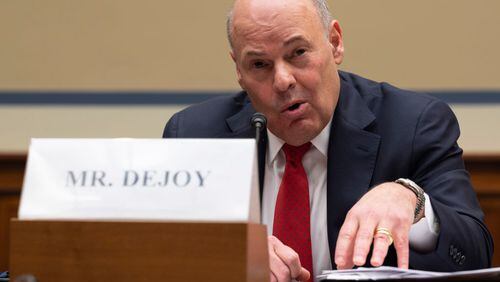The viral photo offered an image of solidarity in the thick of a crisis: In the cabin of a Southwest Airlines plane bound for New York City, more than two dozen Georgia health care workers look up from their seats, all smiling and making heart shapes with their hands.
Southwest posted the photo on Instagram late last month, just as the novel coronavirus pandemic was exploding in New York. “This photo embodies it all: bravery, courage, and sacrifice,” the post said.
But back in Georgia, where COVID-19 infections are expected to peak in the coming weeks, the image of nurses packed into an outbound airliner could have troubling implications. Fears are stirring of what could happen if too many Georgia doctors and nurses are on the front lines somewhere else.
Wary of potential staffing shortages, the Georgia Nurses Association’s COVID-19 task force is drafting recommendations to Gov. Brian Kemp on ways to avert a shortfall, said Matthew Caseman, the association’s chief executive officer.
“It’s a very big concern,” he said. “We need to look into finding incentives and ways to keep nurses here in Georgia.”
Caseman said he could not provide details about the proposals to Kemp because they are still being drafted, but they will likely involve student loan forgiveness programs and boosting compensation.
Long before the outbreak, doctors and nurses have been in short supply and the problem has worsened. Five months ago, the state Department of Health declared on its website that Georgia’s nursing shortage had reached a “crisis level,” exacerbated by low wages and retirements outpacing new recruits.
Now, with hospitals cancelling most elective procedures and emergency room traffic down because of infection fears, some employers have been cutting hours, slashing pay rates and furloughing workers. At the same time, amid supply shortages many Georgia nurses have been ordered to cut back on their use of N95 masks and other protective equipment, and some are sharing a Change.org petition asking for tax-free pay and a risk allowance for treating COVID-19 patients.
Meanwhile, private staffing agencies in York have been beckoning other medical workers by promising fat paychecks and sweet incentives.
While registered nurses in Georgia average $30 an hour — 6% lower than the national average — some agencies recruiting nurses to New York City are offering pay rates ranging from $4,000 to $7,250 per week. Virginia-based Caliburn International is offering emergency room doctors $315 per hour, plus overtime.
Also in the mix of incentives — free airfare, hotel rooms, car rentals and free Starbucks coffee, according to Nurse.org.
Irma Westmoreland, a registered nurse at the Charlie Norwood VA Medical Center in Augusta, said that yesterday three intensive care unit nurses who grabbed N95 masks from a distribution point were questioned by security officers, read their Miranda rights and threatened with misdemeanor larceny charges for taking the masks without permission. Each of them had only taken one mask to wear at work, she said.
Westmoreland, who is a vice president of the National Nurses United union, said she’s hearing more and more rumblings from coworkers thinking of bolting to New York.
“A nurse even said, ‘It sounds better and better,’” Westmoreland said. “‘If I’m going to be treated this way, and I’m going to take care of the patients anyway, I may as well take care of them there for a lot more money than I’m getting for taking care of them here.’”
Georgia also has lost doctors and nurses who for purely altruistic reasons responded to New York Gov. Andrew Cuomo’s plea to help at the epicenter of the national outbreak. As of Wednesday, New York City had close to 82,000 confirmed cases and 4,755 deaths.
More than 1,000 people are volunteering in the city’s public hospital system, from nearly every state, a spokeswoman for the system told The Atlanta Journal-Constitution. More volunteers are expected, she said. More than one-quarter of the 90,000 health care workers who applied to help throughout New York state are from other states, officials told the AJC. About 7,000 additional workers are assisting in hospitals statewide, New York officials said.
Departure numbers uncertain
Caseman, of the nurses association said he does not know how many Georgia nurses have shipped out, and no one within state government appears to be tracking the issue. Neither the Georgia Board of Nursing nor the Department of Public Health is keeping up with departures of health care workers. With New York allowing out-of-state nurses to practice with their existing licenses, no one in New York appears to be keeping statistics, either.
But one measure of the exodus comes from NurseFly, a temporary health care staffing website that connects nurses with staffing agencies. According to the company, “hundreds of nurses from Georgia” applied for jobs in New York state through its platform in March, and the number will likely surpass 1,000 in April as pay rates continue soaring.
“This is a huge uptick,” NurseFly CEO Parth Bhakta said in a written statement, “as previously nurses with licenses from Georgia had to obtain New York licensure which could take anywhere up to six weeks. Recently, New York loosened the licensure requirements, allowing nurses from around the country to come help.”
Shane Jackson, president of Jackson Healthcare, one of the nation’s leading staffing companies, said more than 450 nurses and other Jackson Healthcare workers have been deployed in the state of Georgia — a number that is rising quickly. In addition, 150 healthcare professionals have been deployed to New York from different parts of the country, but primarily from areas surrounding New York. The demand is greatest for critical care nurses and respiratory therapists.
Jackson said he expects a “pinch” in coming weeks for critical care nurses as medical experts anticipate a surge in deaths from COVID-19. He also noted that some health care workers are nervous or scared, and a “handful” of nurses have contracted the disease, which sidelines them.
Still, State Rep. Sharon Cooper, a registered nurse and chairwoman of the House Health and Human Services committee, said she isn’t concerned about a significant loss of Georgia nurses. Cooper said she checked with hospital contacts and emergency room doctors, and while there is some chatter among furloughed workers about heading to New York, no one seems worried about a looming shortage.
“Our nurses are loyal, and our nurses, just like our physicians, will answer the call at their hospitals to come back in,” said Cooper, R-Marietta. “And for every one that doesn’t answer the call because they went off, there will be a retired nurse, or somebody who was taking a break, who steps in to take that nurse’s place. You sit back and watch it.”
And while the state Board of Nursing doesn’t keep track of nurses leaving to work in other states, it says that since mid-March it has granted 175 temporary licenses to nurses from other states.
Caseman makes the point, though, that with Georgia already critically short of nurses before the pandemic, when hospitals are hit by a surge of COVID-19 patients, they may be begging for help themselves. “It’s just the crisis and the incentives in other states that are worsening the situation,” he said.
Already, Phoebe Putney Memorial Hospital in Albany has had to plead for more doctors and nurses after it was swamped with coronavirus patients. The state sent National Guard medical support teams to help and Albany State University provided rooms for traveling nurses who came.
Harry J. Heiman, a clinical associate professor in Georgia State University’s Department of Health Policy and Behavioral Sciences, said whether outside recruiting threatens Georgia’s ability to face a crisis will depend on the numbers who leave.
He sees the attempts by states to compete against each other for medical workers as a failure of leadership by the federal government, which should be deciding how to allocate resources to areas that need them most.
“It’s not how you organize and coordinate a response to a pandemic,” Heiman said. “It becomes a wild west of not only trying to entice health care workers, but a wild west of getting the personal protective gear you need, of states bidding against one another for ventilators, and everything else.”







